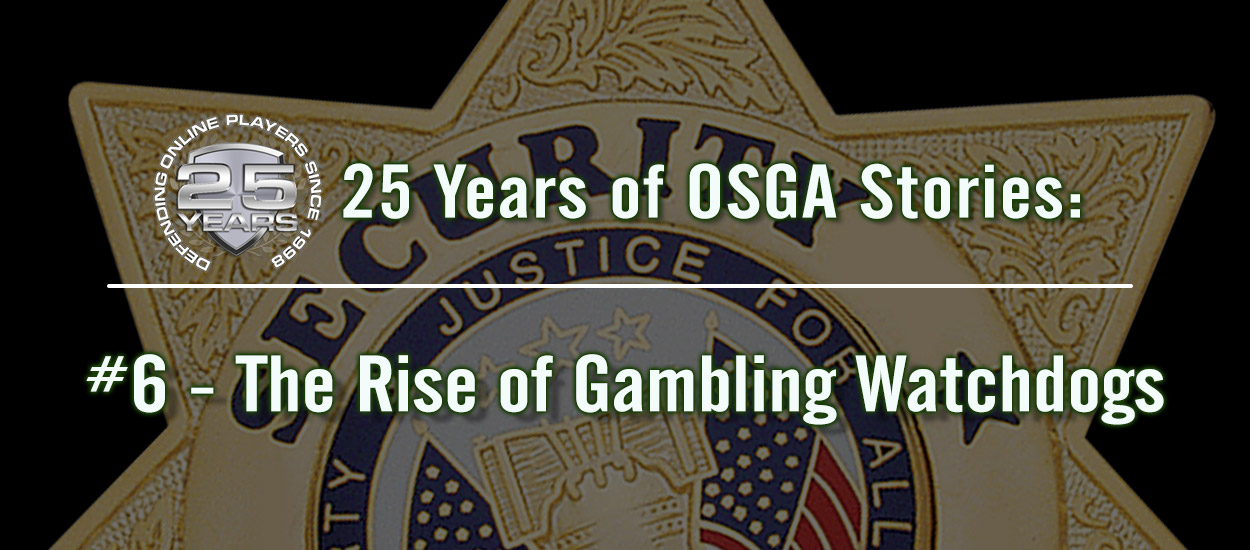Once gambling companies embraced the Internet, watchdog sites popped up to help with the fledgling undregulated industry
Offshore gambling in North America began long before the launch of internet wagering. In 1985, a Canadian turned Brit gambling industry entrepreneur named Gary Bowman started a company called American Football Pools. The laws of the UK did not restrict where bets could be placed and Bowman accepted football parlay cards in the mail from numerous locations including the United States and Canada. Seeing the success, he started up a company called Sports Action International based in Manchester, England that accepted bets on the telephone from anywhere in the world. The company’s name would later be changed to Bowman’s International. Bowman’s advertised in North American newspapers and on TV and radio. Customers had to call a 1-800 number in the UK to place the wagers and bookmakers would give them the lines, although by about 1993 there was a way to see the lines in real time, once the world wide web became a viable medium as part of sites like AOL and CompuServe. The minimum bet was $20 and the bettors had to pay a 10% tax on either the stake or the win amount – they had to choose up front. Not long after other phone in betting companies started up including World Wide Telesports (WWTS), Tradewinds, SGB Global and Intertops among others. Gary Bowman would eventually sell his operations to Bet365 for Canadian customers and to WWTS for American customers.
The Internet spurs "watchdog" sites
By 1995, with the internet becoming more mainstream, the two largest searches on the internet were gambling and porn.  Along with the legitimate and popular gambling companies there were a few others there were very sketchy and clearly just scams. Included in these was a place called Top Turf that advertised heavily claiming to be in the Caribbean, but actually had no office there and rarely if ever paid winners. The same held true for a company called Dial-A-Bet. It was clear that these scammers were out to simply take money from unwitting gamblers, so in 1994 Jeff Brown and Brian Georgia set up very crude text-based websites called Oddswiz and Bookie’s Hell respectively. These forums provided a platform for gamblers to discuss betting and also to mention sportsbooks that they recommended as well as to point out scam operations to protect others. Brown and Georgia teamed up a year later to launch a website called BettorsWorld, which became a very popular place for gamblers. It was also the first website where I posted industry articles. Bettorsworld became known as an "industry watchdog", given the name because they were watching out for the interest of gamblers, so those looking to place a bet offshore knew where they could bet and feel safe as well as places to avoid. Not long after other watchdog sites started operating as well. These included but were not limited to The Prescription (TheRx), founded by the late Ken Weitzner, Sportsbook Review, founded by John Walker, MajorWager founded by the late Russ Hawkins and of course the Off Shore Gaming Association (OSGA) founded by Jim Quinn. The huge growth of internet wagering from tax free destinations in Antigua, Costa Rica, Curacao, Malta, Gibraltar and the Isle of Man made it clear that these industry watchdog sites were more necessary than ever. To pay for the continued operation of the websites and for staffing, the watchdog companies began accepting advertising from gambling sites either as a lump sum monthly fee or more often for an affiliate program whereby the watchdog company is given a percentage of all losses in perpetuity from bettors who signed up via a dedicated link. Along with a posting forum and information on scam sites, many places like OSGA also provided news and articles from people in the industry. And OSGA also has a membership feature that provides additional benefits ,including the ability to dispute any bets they believe were graded unfairly and contests. OSGA President and CEO Jim Quinn explains exactly how OSGA is different from other watchdog sites.
Along with the legitimate and popular gambling companies there were a few others there were very sketchy and clearly just scams. Included in these was a place called Top Turf that advertised heavily claiming to be in the Caribbean, but actually had no office there and rarely if ever paid winners. The same held true for a company called Dial-A-Bet. It was clear that these scammers were out to simply take money from unwitting gamblers, so in 1994 Jeff Brown and Brian Georgia set up very crude text-based websites called Oddswiz and Bookie’s Hell respectively. These forums provided a platform for gamblers to discuss betting and also to mention sportsbooks that they recommended as well as to point out scam operations to protect others. Brown and Georgia teamed up a year later to launch a website called BettorsWorld, which became a very popular place for gamblers. It was also the first website where I posted industry articles. Bettorsworld became known as an "industry watchdog", given the name because they were watching out for the interest of gamblers, so those looking to place a bet offshore knew where they could bet and feel safe as well as places to avoid. Not long after other watchdog sites started operating as well. These included but were not limited to The Prescription (TheRx), founded by the late Ken Weitzner, Sportsbook Review, founded by John Walker, MajorWager founded by the late Russ Hawkins and of course the Off Shore Gaming Association (OSGA) founded by Jim Quinn. The huge growth of internet wagering from tax free destinations in Antigua, Costa Rica, Curacao, Malta, Gibraltar and the Isle of Man made it clear that these industry watchdog sites were more necessary than ever. To pay for the continued operation of the websites and for staffing, the watchdog companies began accepting advertising from gambling sites either as a lump sum monthly fee or more often for an affiliate program whereby the watchdog company is given a percentage of all losses in perpetuity from bettors who signed up via a dedicated link. Along with a posting forum and information on scam sites, many places like OSGA also provided news and articles from people in the industry. And OSGA also has a membership feature that provides additional benefits ,including the ability to dispute any bets they believe were graded unfairly and contests. OSGA President and CEO Jim Quinn explains exactly how OSGA is different from other watchdog sites.
"We always looked to help a player, whether it be with finding the right place to play, avoid a scam joint or assist with a complaint," said OSGA head Quinn. "We actually visited the facilities of every place we 'endorsed' back then and still visit operations regularly. We also never had an open posting forum, which turned off many gamblers.  But we found that doing things out of the public eye, and this was before social media, was exceedingly effective. We helped players for free to recover money, get paid, have accounts from scam books taken over, etc., and not just a few guys here and there, but thousands over the last 25 years."
But we found that doing things out of the public eye, and this was before social media, was exceedingly effective. We helped players for free to recover money, get paid, have accounts from scam books taken over, etc., and not just a few guys here and there, but thousands over the last 25 years."
While watchdog sites did their best to ensure accuracy and completeness in pointing out scam operations and avoid taking advertising from questionable sites, they weren’t infallible. One prime early example was a sportsbook called Rich’s Sportsbook based in the Dominican Republic that was a phone in book and operated until 1998. The book was owned by a Philadelphia based bookie named Rich Ciarlante. Rich’s Sportsbook became a darling among bettors who posted on the forums and Rich’s advertised at quite a few of the sites. Rich’s popularity was due to a bonus scheme that Ciarlante devised whereby players were given a 10% bonus on every deposit they made. Unfortunately, Ciarlante put no rollover requirements on the deposits so bettors would deposit say $1,000 and bet the $100 bonus. If they won, they would withdraw the post up money and winnings. If they lost, they would withdraw the post up money. And they would do this continuously since there was no limit on how often they could receive bonuses for deposits, so the bettor had no risk whatsoever. People who only deposited for a bonus and never made a real bet became known as “bonus whores” and they were so prominent that Ciarlante couldn’t keep up with the risk-free losses and had to eventually shut down.
But often watchdog sites fell victim to their own greed. Weitzner was a well documented compulsive gambler who placed bets with the companies he took advertising from and often demanded favorable lines and credit. He also bet far more than he received. He eventually sold the Rx but started a new site called Eye on Gambling (EOG). By the time he died in 2010 his debts were so high that it apparently led to severe depression along with alcohol and drug abuse. According to obituaries, he killed himself, his wife and his dog in an apparent suicide pact by locking themselves in a garage with a car running. Many say that his wife Jennifer did not sign a pact and was simply killed by Ken in a selfish final act.
Russ Hawkins, the CEO for MajorWager, generally advertised only companies he could verify, but for a brief time he agreed to accept advertising from companies that he later admitted he did not vet well that left players in the dust. Two of the more notable ones were BetCamelot and NewAgeBets. These two sportsbooks were brand new to the industry and only advertised on MajorWager. Despite their lack of a documented history, Hawkins agreed to provide them advertising and both went out of business within months of beginning operations. BetCamelot was owned by a New York Attorney named Mark Delpopolo, who regularly posted on the MajorWager forums and claimed to be sharper than most bettors. So, he went to Costa Rica and set up a sportsbook called BetCamelot. Unfortunately, it quickly became clear that Delpopolo was not as smart as most bettors, plus he refused to hire good traders and risk managers. Delpopolo was also known to go on the MajorWager forums and to brag to bettors about losses and berate them for winning, particularly on sports like NASCAR. To Hawkins’ credit, he guaranteed the post up funds for anyone who signed up with books using the links on MajorWager and by several confirmed accounts, Hawkins paid out tens of thousands to bettors who got screwed over by the rogue books. Hawkins also apologized to bettors for the mistake and later only advertised for books he could verify had the capital to pay. Hawkins also used much of the money he made on MajorWager and other ventures in very philanthropic ways saying in a newspaper interview that he never took for granted that much of the prosperity he gained was as a result from posters and employees on the MajorWager forum and he was always looking forward to paying people back in any way he could for their loyalty.
Bettorsworld and some other watchdog sites fell into the trap of disallowing negative comments on the forums about sportsbooks that advertised with them. This led to some posters getting taken to the cleaners despite valuable concerns. Many of these sportsbooks including Alladin’s Gold, Ace’s Gold/SportsMarket, Caribi and Dunes were industry stalwarts and it was truly a shock when the owners of those sites took off with player money. So, Georgia admitted that restricting negative comments on the forum about these sites when some people weren’t getting paid or had concerns was a mistake.
When the two largest forum-based sites all but disappeared, a smaller site took the reigns as a place for gamblers to converse, commiserate and vent, Sportsbook Review. In the age of the Google Search algorithm, the sportsbookreview.com URL proved invaluable as internet gambling got bigger and SBR became a valued site that worked on behalf of players. However, they also found themselves mired in controversy over the public handling of issues with advertisers and several sites that were given a thumbs up ran with player funds. The site was sold to the company that purchased Covers several years ago and today the site recommends US based sportsbooks to US players.
Yet despite indiscretions and mistakes, watchdog sites have become invaluable to bettors and have saved them countless dollars by pointing out gambling operations to avoid. OSGA’s Sportsbook Blacklist Offshore Report : Bad Bet Updates is still updated regularly and is a place where bettors can go to see if a sportsbook they are considering has any concerns about them.
It’s easy to look at the industry today with all the regulated sites like BetMGM, FanDuel and DraftKings and the well respected, long serving offshore sites like BetOnline, Bookmaker and Heritage Sports and believe the industry was always this well served, but the truth is that internet gambling has gone through many highs and lows and only now are we seeing the cream rise to the top. One thing is certain, however. Many bettors were saved from losing a lot of money thanks to watchdog sites.
Read insights from Hartley Henderson every week here at OSGA and check out Hartley's RUMOR MILL!






































